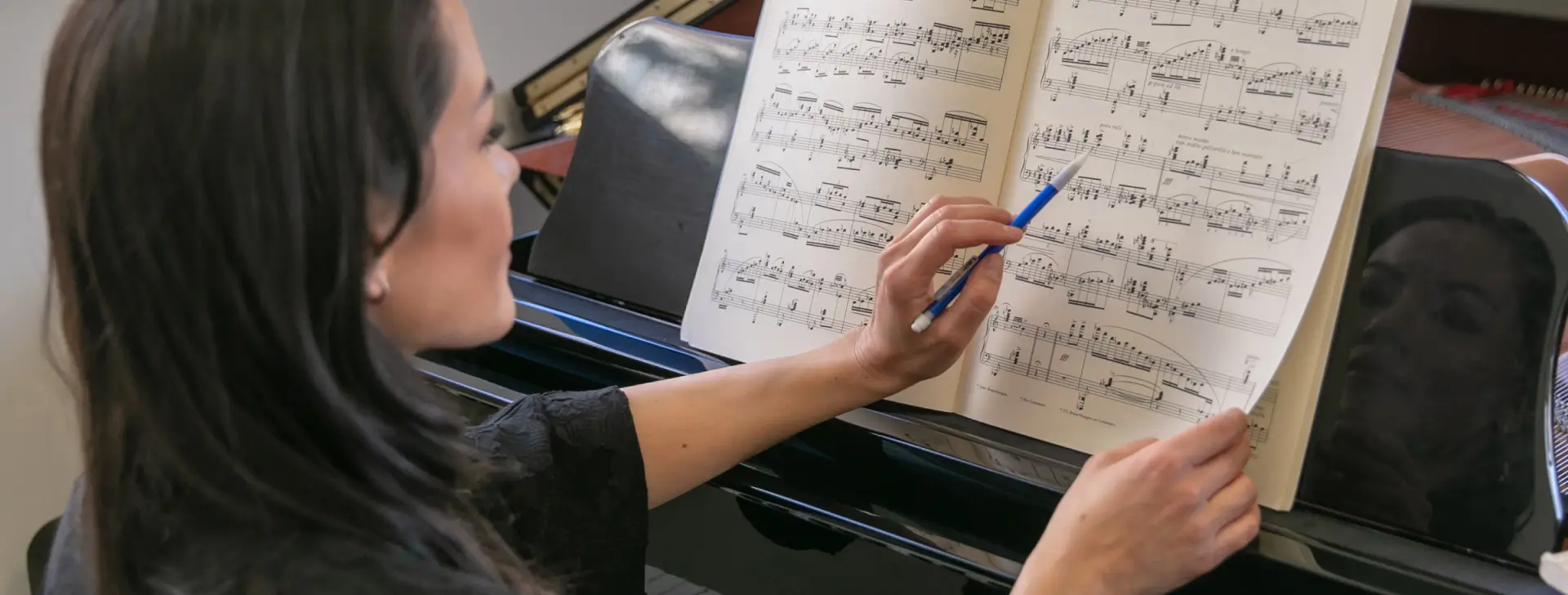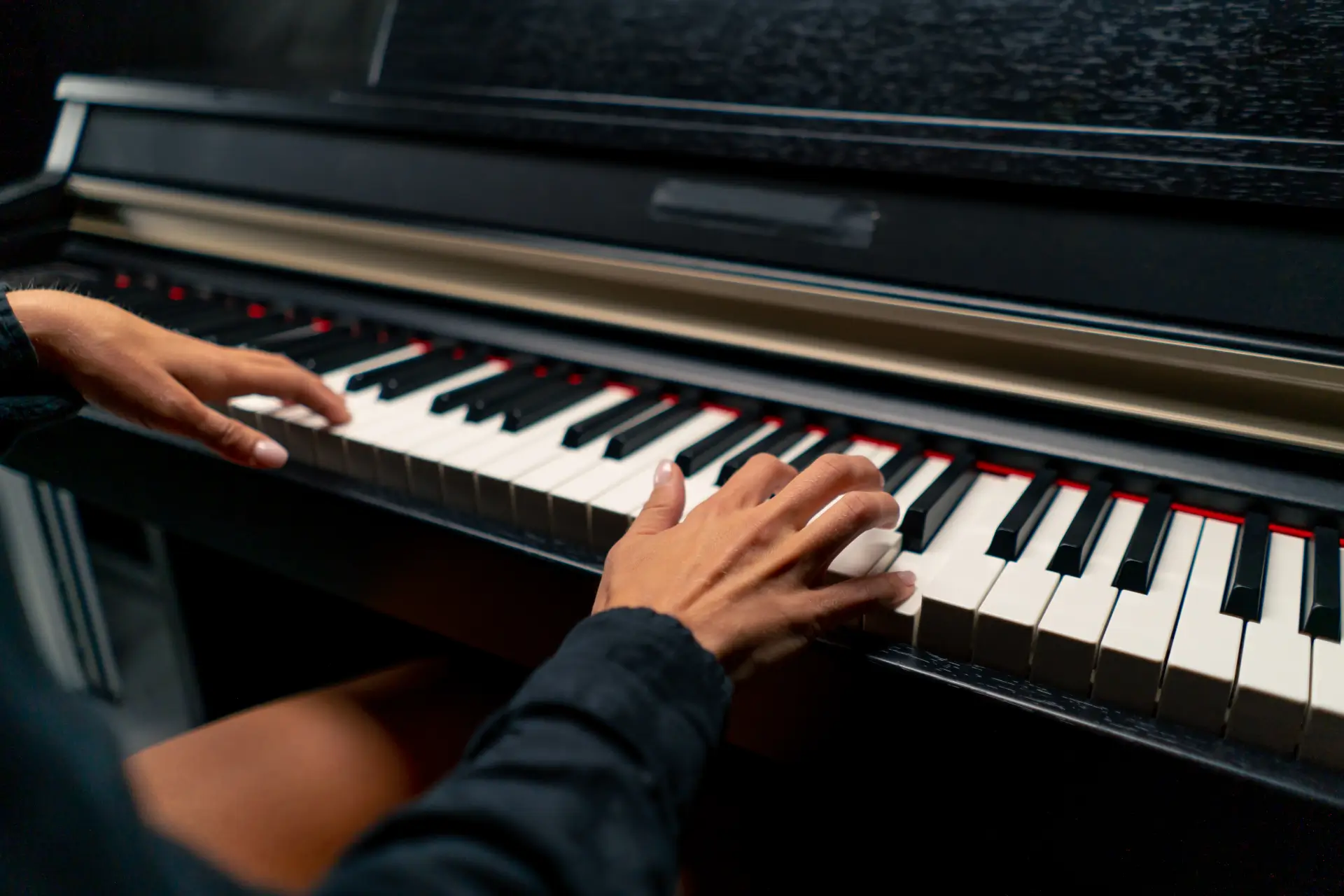Table of Contents
Why do you want to learn a musical instrument?
When starting music lessons, a common question us teachers like to ask our students is why they’ve decided to learn a musical instrument.
A very common answer we receive is:
“I just want to have fun.”
Great! …right?
At first glance this must be the perfect answer. It’s a wonderful goal that comes from a beautiful place of intention, and awareness of the joy that music making can bring.
But this seemingly positive statement is one that can sneakily wreak havoc on one’s motivation and mindset as they move forward in their learning experience.
Keeping things Light with Shortcuts in the Learning Process
In our fast-paced world, we are regularly tempted with shortcuts and quick fixes that, although appealing, can rob us of the true joys and rewards of the journey.
Countless apps and online programs are designed to help us bypass challenges or having to experience feelings of frustration. All in an effort to keep the learning process “fun” and light-hearted, and moving at
ever increasing speeds.
But when you look closely, these shortcuts and cheap dopamine hits deliver the opposite of meaningful joy. Pursuing only a steady stream of instant gratification and fun along the way leads to more short term
satisfaction but decreasing motivation over time. Because the further along you progress, you will inevitably hit a point of challenge or when things become less “FUN”.
Don’t get me wrong, there is a lot of joy and fun to be experienced throughout the process. If we want to fully reap the many rewards of learning a musical instrument, there are common pitfalls you may be setting yourself up for if your top priority is to make sure to always “keep it fun”.
Here are 5 Signs that Your Need to "Keep Things Fun" may be taking the JOY out of learning an instrument.
1) Thinking of Music Lessons as Entertainment, Not Education:
Learning a musical instrument is known as the ultimate lesson in delayed gratification! Which means that while music is undeniably a form of entertainment, the process of learning it can feel quite different. It
requires skills to be built, knowledge to be cultivated, and a great deal of immersion and repetition. Music is associated with entertainment, parties and special occasions, so there can be a sense of alarm if lessons and practicing aren’t feeling as entertaining. There will surely be activities that are more enjoyable than others, and that’s par for the course.
Learning to play a musical instrument is often compared to learning a language. It takes some time to gain the confidence you need to truly have fun with it. When we think of the process as educational, we can enjoy the moments that do feel like a party, and also feel empowered in the moments when we struggle.
2) Dropping Pieces When Challenges Arise:
Feeling frustration is a natural part of the learning and growth process. There is something to be said about not stretching too far outside of your current level and ability, but avoiding difficult pieces in order to stick to ‘fun’ ones can deprive you of deeply rewarding growth experiences. Remember: growth often happens outside the comfort zone.
In fact, studies have revealed that emotions of feeling challenged are a necessary component of deep learning. Also, our feelings of frustration almost always happen just as we are about to push through to a new level of growth. If you find yourself dodging pieces as they start to feel frustrating, you may actually be missing a great opportunity to dig deep and reach a new level. There are many ways that you can adapt your learning in order to continue forward without needing to quit. Beautiful things will happen outside of your comfort zone.
3) Relying on Extrinsic Motivation:
While motivation is great, the truth is that it’s a feeling that’s fleeting. Building strong internal processes and awareness supported by your family or mentors, is crucial for consistent progress. A common
challenge parents of young children often face is the slippery slope of offering “prizes” in an attempt to motivate future behavior.
This becomes a slippery slope because it shapes the belief that the reward comes from the value of the prize received, instead of the feeling of accomplishment and skills developed within. Learning to identify challenges and celebrate every small accomplishment can help to stir that intrinsic motivation. There may be discomfort when working through challenges, but a mindset of valuing working hard towards your goals will be far more gratifying than any external gift or prize could be.
4) Letting Young Children Dictate Lesson Direction:
By nature, children often express their immediate wants over their long-term needs. With emotional and cognitive maturity, we all learn to understand the importance of responsibility, long-term outcomes and delayed gratification. As parents and teachers, it is so important to observe and be attentive to the needs and feedback of our young students, while also knowing that what a young child expresses is often their
immediate wants over their needs. Repeatedly asking a child to decide if they want to continue in formal music lessons is similar to asking the child repeatedly if they would like to continue their school work, maintaining household chores, or brushing their teeth.
By asking for their validation when they do not yet have the maturity to make long term decisions, as opposed to providing the structure and support they need to succeed, you erode their learning process.
5) Comparing Sports Practice to Solo Instrument Practice:
While both of these activities certainly require dedication and their own unique benefits, in many ways they’re vastly different experiences. Comparing the two can lead to skewed expectations. Children participate in many tedious tasks and repetitive drills as part of a sports team, but this will feel quite different from the repetition of instrument practice because they have the physical movement and that group momentum.
Music practice involves much mental activity but it is often a solitary activity of self-discipline. Self-discipline often involves challenging yourself to overcome internal obstacles or resist temptations. You are your own opponent. Comparing that the experience of practicing an instrument should have the same feedback cycle as a group sports activity leads to very skewed expectations.
The most fulfilling joys come from deeply engaging with the learning process, not just seeking instant gratification. Embracing challenges, celebrating every small step, and focusing on the journey can lead to a richer, more rewarding musical experience.
Tag:
Share:

Carmen Morin
Concert pianist, educator and arts entrepreneur.
I empower pianists with transformative learning systems to break through technical limits, unlock talent, and build lasting confidence.
You may also like...






Comments are closed.